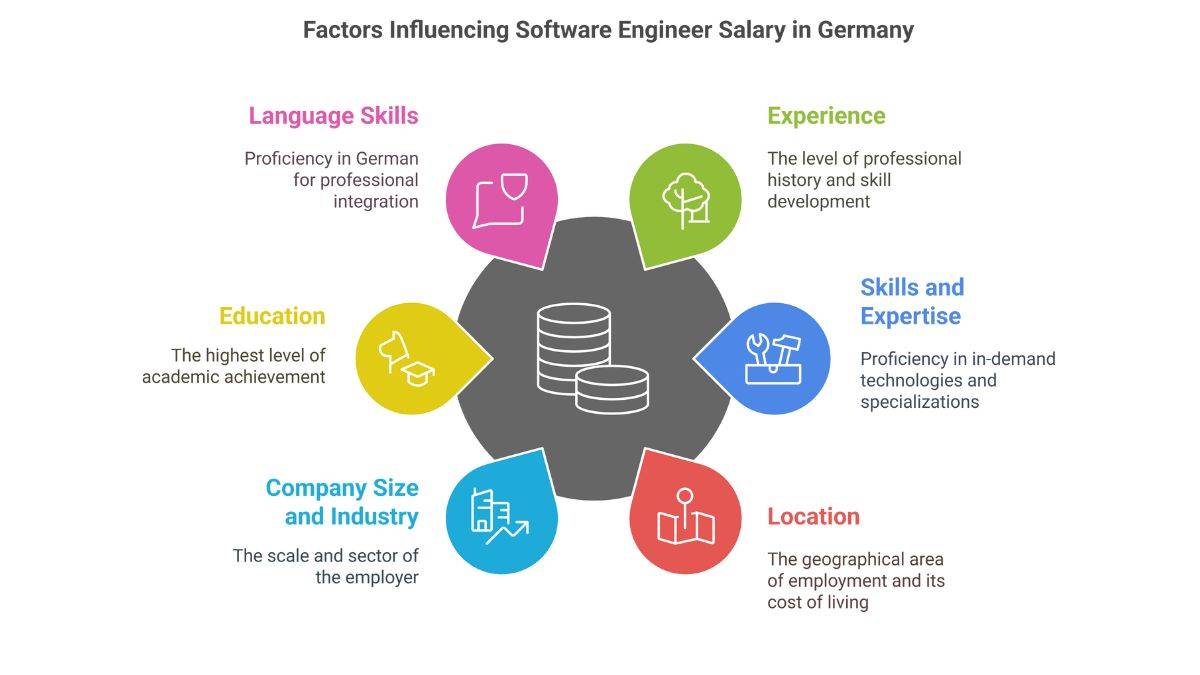Software Engineer Salary in Germany 2025
Germany is one of the best places for software engineers. It has a strong tech industry, good work culture, and many chances for career growth.
Software engineers in Germany earn good salaries and find many job opportunities. On average, they make between €60,000 and €90,000 per year. Fresh graduates generally earn €45,000 to €55,000 per year. It is known that the more experience you get, the better salary will be.
For example, mid-level engineers with 3–5 years of experience can earn €60,000 to €80,000, while senior engineers with more than 5 years can make up to €120,000 or more.
Your income also depends on your skills and the city where you work. Cities like Munich, Berlin, and Frankfurt usually offer higher pay. If you know cloud computing, cybersecurity, or artificial intelligence, you can earn even more in Germany.
- Average Software Engineer Salary in Germany 2025
- What Affects Software Engineer Salary in Germany
- Software Engineers Salary in Germany based on Experience
- Mid-Level Software Engineer
- How to Improve Your Salary in Germany
Average Software Engineer Salary in Germany 2025
Average salary for a software engineer in Germany in 2025 is near €68,750 a year, but it not same for everyone. Some people make more, some little less. It really depends on your experience and the city where you work. Many engineers earn something between €62,000 and €81,000 per year.
If you just starting your job, your salary in Germany may be around €45,000 to €55,000 yearly. After some years, when you get more skills and experience, you start earning higher.
Big cities pay more. Like in Berlin, software engineers make near €70,000. Some smaller cities pay less, but cost of living also smaller. Your software engineer salary in Germany always depends on what you know, where you work, and how long you been doing it.
What Affects Software Engineer Salary in Germany
Software engineer salary in Germany changes for everyone; it depends on things like experience, city, company, and how much you studied. When you have more experience, or work in big cities like Berlin or Munich, you get better pay. People working in big tech or finance companies also earn more.
Predict your IELTS, TOEFL, and PTE in just 4 steps!
If you studied more, like having a master’s degree, or got extra certificates such as AWS, Google Cloud, or Microsoft Azure, your salary can go higher too. A senior developer can earn way more than a junior one, that’s for sure.
In cities like Frankfurt or Munich, companies pay extra because life is more costly there. Small startups don’t always pay much, but sometimes they give other benefits. Jobs in finance, automotive, or telecom usually give better money than education jobs.
Also, your skills matter. A Full Stack developer can earn more than a software tester. If you talk well and negotiate right, you can even get a big salary jump when changing jobs, around 7–15%, while yearly raises are small, like 3%.
Software Engineers Salary in Germany based on Experience
| Position |
Average Salary Range (per year) |
|---|---|
| Junior Software Engineer |
€42,000 – €55,000 |
Mid-Level Software Engineer |
€55,000 – €70,000 |
| Senior Software Engineer |
€70,000 – €85,000 |
| Lead Software Engineer |
€85,000+ |
Websites to find Software Engineer Jobs in Germany
- GermanTechJobs
How to Improve Your Salary in Germany
If you working in Germany and feel your salary not enough, don’t worry. Many people feel the same thing. Life cost going up but pay not matching that. You can still do few easy things to increase your salary in Germany.
1. Change Your Job
Sometimes the fastest way to earn more money is just find another job. Many workers in Germany got 30% to 40% more salary after moving to new company. Companies like hiring people who already got good experience.
2. Learn New Skills
Try learning something new or take technical certification. You can study online also. When you have more skills, boss see you more valuable and you can ask more pay.
3. Study More
If you can, do a master’s degree or extra course in your field. It help you look more qualified. German employers like when people keep studying. Later it helps you get higher salary too.
4. Pick Better Industry
Work in area where more jobs coming like IT, renewable energy or finance. Those places pay more money and you get better growth also.
5. Talk About Your Salary
When you get offer, check online what is average salary in Germany for your job title. That help you talk better and not accept less money.
Yes, 320 is a very strong score for Germany. Most German universities look for a score around 300 to 310. If you have 320, you are well above average. It will help you get into top schools like TU Munich or RWTH Aachen. Focus more on the Quant score for engineering courses.
Some of the reasons to study at the University of Europe for Applied Sciences are:
- UE Germany is one of the most diverse student bodies in Europe with students from more than 100 nationalities represented on campus
- Students at the university are globally connected through international projects, innovative digital learning projects or by directly interacting with international fellow students
- Offers a practice-oriented degree
Pick your stage and get free guidance from counsellors who've helped thousands get into top universities.
 Starting research
Starting research Shortlisting colleges
Shortlisting colleges Exam preparation
Exam preparation SOP/LOR writing
SOP/LOR writing Scholarship & finance
Scholarship & finance Visa application
Visa application



Usually international students not immediately earn €60,000 plus entry in Germany. Fresh graduates start at €45k–55k. But if you have a strong internship or skills, you might break into mid-level pay faster.